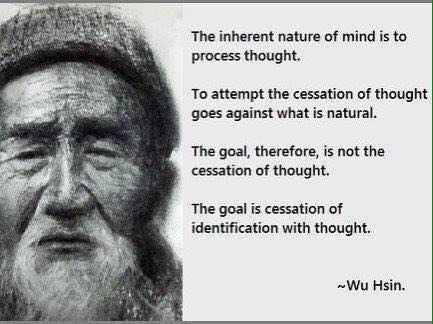-
 Shawn
13.5kI have a quote I want to share in regards to the topic of disidentifying with thought itself. The author is an obscure author of books in China some years after Confucius. The author professes a non-dualistic conception of humans in that there is no mind or body. I don't know the term for this state of affairs; but, it is appealing to me due to my recent topic on 'Disidentification'.
Shawn
13.5kI have a quote I want to share in regards to the topic of disidentifying with thought itself. The author is an obscure author of books in China some years after Confucius. The author professes a non-dualistic conception of humans in that there is no mind or body. I don't know the term for this state of affairs; but, it is appealing to me due to my recent topic on 'Disidentification'.
Here is the quote for those interested:

How does one cease the identification with thought if what the author speaks is true? -
 BrianW
999I think the whole point rests on the idea of self-discipline. The mind (thoughts) and emotions are tools which we use e.g. for self-expression, to engage in perception, among other processes in consciousness. If we don't control our thoughts and emotions, we become like workmen (humans) whose work (lives) are determined by the tools (thoughts and emotions), which is not respectable at all. But if we learn to control them, then we stand a chance at overcoming the chaos in our lives.
BrianW
999I think the whole point rests on the idea of self-discipline. The mind (thoughts) and emotions are tools which we use e.g. for self-expression, to engage in perception, among other processes in consciousness. If we don't control our thoughts and emotions, we become like workmen (humans) whose work (lives) are determined by the tools (thoughts and emotions), which is not respectable at all. But if we learn to control them, then we stand a chance at overcoming the chaos in our lives.
Unfortunately, these teachings also rest on the idea of 'self' being fundamental to everything and for those who are not inclined towards such a school of thought, it all seems like hogwash.
How does one cease the identification with thought if what the author speaks is true? — Posty McPostface
So far I only know of meditation. -
 Valentinus
1.6kOne can approach the matter of "identification" from a number of ways. I am fond of the following from Zhuangzi:
Valentinus
1.6kOne can approach the matter of "identification" from a number of ways. I am fond of the following from Zhuangzi:
" Kai-shi then replied, "I have heard my master say that they who skillfully nourish their life are like shepherds who whip up the sheep they see lagging behind." "What did he mean?" asked the duke. The reply was, "In Lu, there was a Shan Bao, who lived among the rocks, and drank only water. He would not share with the people in their toils and the benefits springing from them, and although he was now in his seventieth year, he had still the complexion of a child. Unfortunately, he encountered a hungry tiger, which killed and ate him. There was also a Zhang Yi, who hung up a screen at his lofty door, and to whom all the people hurried (to pay their respects). In his fortieth year he fell ill of a fever and died. (Of these two men), Bao nourished his inner man, and a tiger ate his outer, while Yi nourished his outer man, and disease attacked his inner. Both of them neglected whipping up their lagging sheep."
Welcome to The Philosophy Forum!
Get involved in philosophical discussions about knowledge, truth, language, consciousness, science, politics, religion, logic and mathematics, art, history, and lots more. No ads, no clutter, and very little agreement — just fascinating conversations.
Categories
- Guest category
- Phil. Writing Challenge - June 2025
- The Lounge
- General Philosophy
- Metaphysics & Epistemology
- Philosophy of Mind
- Ethics
- Political Philosophy
- Philosophy of Art
- Logic & Philosophy of Mathematics
- Philosophy of Religion
- Philosophy of Science
- Philosophy of Language
- Interesting Stuff
- Politics and Current Affairs
- Humanities and Social Sciences
- Science and Technology
- Non-English Discussion
- German Discussion
- Spanish Discussion
- Learning Centre
- Resources
- Books and Papers
- Reading groups
- Questions
- Guest Speakers
- David Pearce
- Massimo Pigliucci
- Debates
- Debate Proposals
- Debate Discussion
- Feedback
- Article submissions
- About TPF
- Help
More Discussions
- Other sites we like
- Social media
- Terms of Service
- Sign In
- Created with PlushForums
- © 2026 The Philosophy Forum



